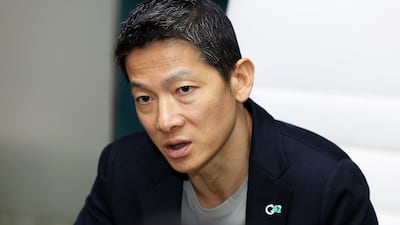UAE artificial intelligence company G42 has a “very strong track to move forward” with the current US administration, but it is also prepared if former president Donald Trump takes office again, its group chief executive Peng Xiao said.
“We are equally prepared, equally comfortable, to work with whoever will become the new leader of the US government,” he said on Tuesday, during a roundtable discussion at the Gitex exhibition in Dubai.
G42 has been boosting partnerships with technology companies worldwide as it seeks to expand its offering. It partnered with global chip maker Nvidia in September to develop AI solutions with the goal of improving the accuracy of weather forecasting and wider technologies. Last week, its AI and cloud company Core42 announced it will be using Nvidia's H100 Tensor Core GPUs in the UAE to provide scalable AI resources.
While there have been several reports of US concerns over sharing advanced technology with competitors, particularly China and Russia, Mr Xiao said G42's co-operation and policies helped to ensure the growing US-UAE partnership.
He said G42 operated in compliance with the US Commerce Department’s Validated End User status policy expansion announced in late September, which permits approved entities to receive chips under general authorisation, rather than requiring US suppliers to have a previous licence.
The UAE has its own Regulated Technology Environment policy that he described as a “fully guarded, fully open management system”. The system has direct input from the US government and partners.
“They can see exactly which products and personnel and software IP enter our country, exactly how each element is being utilised to serve which causes,” he said, adding that from “cradle to grave, we have full transparency”.
That also applies to "which end users, and exactly how we depreciate such capabilities over time and eventually retire those systems and where they go", he said. This system of protecting advanced AI technology is airtight, “there is no back door”.
Connecting intelligence
Mr Xiao also highlighted the importance of establishing an intelligence grid, a term he said was coined at Davos in January. It was expanded on when he accompanied President Sheikh Mohamed during his visit to Washington in September, which included meetings with US industry leaders.
An intelligence grid would connect the AI and other intelligence capabilities of one nation or entity to the rest of the world. It would ensure the free flow of intelligence to serve those who are in need and help democratise its access, Mr Xiao explained.
It starts with semiconductor chips, which connect to intelligence factories that would generate data 24/7 to connect to a global intelligence grid. “That’s our ultimate vision,” he said. “We want to go from making tools to building factories to then connecting factories which already can produce intelligence and to ensure the free flow of intelligence.”
He said that "they are at the heart of this programme". The H100 series is part of this effort, but is not the most advanced. “There’s the H200 and the GP 200 is coming. Our friends at AMD, they are making MI350x chips. Our friends at Cerebras, a company which we invested in, are building their CS-3, CS-4 chips,” he added.
The National asked Mr Xiao about how G42 plans to acquire this next generation of semiconductor chips. “We’ll be able to access a lot of them from different sources, because our partners realise, I think, and understand and appreciate why we’re doing this,” he said, adding that the company's goal is to develop AI for public good.


